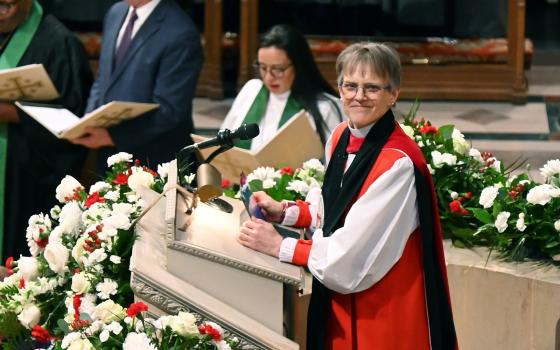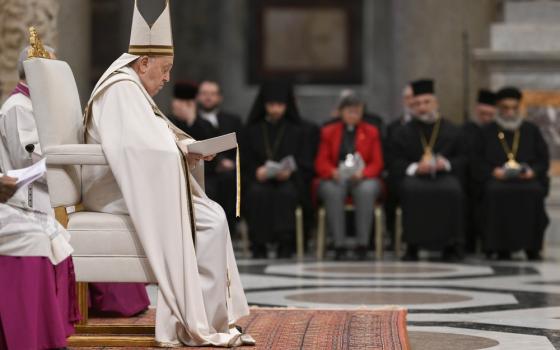A banner hangs outside St. Francis of Assisi Church in New York City following an annual Pre-Pride Festive Mass June 26. The liturgy, hosted by the parish's LGBT Ministry, is traditionally celebrated on the eve of the city's Pride march. (CNS/Gregory A. Shemitz)
Advocates and theologians who study issues related to sexual orientation and gender identity are criticizing a Michigan diocese's policy that restricts LGBTQ Catholics from the sacraments and church leadership positions.
"It's a cruel policy that excludes LGBTQ Catholics from the body of Christ. I'm entirely opposed to it as I believe it runs contrary to the Gospel and to the spirit of inclusion that we find in Jesus' ministry," said Jason Steidl, a gay Catholic theologian who teaches religious studies at St. Joseph's College in New York.
Steidl told NCR that he believes the Diocese of Marquette's policy, which asks pastors to deny baptism, Communion and confirmation to gay, transgender and nonbinary Catholics unless they have "repented," "reveals a lot of things about where the Catholic Church is at right now."
"There's an increasing divide between popular culture, where grassroots Catholics are coming from, and what the hierarchy teaches is revealed from God," Steidl said. "I think that separation is especially clear within this document."
Advertisement
In July, the Marquette Diocese issued its policy, a 15-page document that presents what critics contend is a simplistic view of church teachings on sexuality and gender. The policy is titled "Created in the Image and Likeness of God: An Instruction on Some Aspects of the Pastoral Care of Persons with Same‐Sex Attraction and Gender Dysphoria."
Signed by Bishop John Doerfler and MaryAnn Bernier, the diocesan vice chancellor, the policy says people in same-sex sexual relationships and those who identity as a gender different than their assigned sex at birth should not receive the sacraments, including the anointing of the sick. It also prohibits them from serving as baptismal and confirmation sponsors.
In a statement posted Dec. 8 on its website, the Diocese of Marquette said the policy "focuses on accompaniment with dignity and respect for the person, while remaining faithful to the teachings of the Church."
The policy permits children of LGBTQ parents to be enrolled in Catholic schools and parish religious education programs, with the caveat that they "will be instructed according to the Church's teaching on marriage and sexuality in an age‐appropriate manner."
The policy came to light after Jesuit Fr. James Martin, editor-at-large of America Media and an outspoken advocate for LGBTQ Catholics, wrote about it Dec. 7 on Twitter.
"It's important to state this clearly: it is not a sin to be LGBTQ and it is not a sin to be transgender," Martin told NCR. "The sacraments are not just for straight people. What's more, as the Holy Father has said, the Eucharist is not a 'prize for the perfect.' Catholic leaders should be aware of the real-life effect that such stigmatizing language has on LGBTQ people and their families."
Chris Damian, a gay Catholic attorney who has written about Catholicism and same-sex desires, told NCR that the Marquette policy reflects discredited beliefs about homosexuality resulting from childhood trauma.
"It’s a position that has been largely discredited, but it has been able to hide beneath the surface because a lot of these conversion therapists have rebranded themselves and found other ways to engage church leadership," Damian said.
In one section, the document says that people "are not defined or identified by our sexual attractions or conflicts about sexual identity." The document suggests that "it is best to avoid identifying persons" as gay or transgender. Instead, the document argues, "it speaks more to our fundamental identity and dignity as persons" to speak of someone being same-sex attracted or having gender dysphoria.
"This is the type of language that entered the church and became a part of the church's popular discourse through conversion therapists," Damian said. "It's this idea that you need to combat a political and neurotic gay identity with your true identity, which is your identity in Christ."
National organizations that advocate for LGBTQ Catholics such as DignityUSA and New Ways Ministry released statements criticizing the Marquette policy as harmful and exclusionary toward LGBTQ Catholics.
"Catholics in the pews, who polls consistently show overwhelmingly support LGBTQ people, will balk at these penalties," Francis DeBernardo, executive director of New Ways Ministry, said in a prepared statement.
"It is appalling that, under the guise of 'pastoral care,' this document essentially strips LGBTQ+ people from any role in the church other than sinner," DignityUSA Executive Director Marianne Duddy-Burke said in prepared remarks.
'They're not listening to trans people who see their trans identity as who God is calling them to be.'
— Jason Steidl
Daniel Quinan, a canon lawyer based in Minnesota, told NCR that the Marquette document also presents a one-sided view of "spiritual accompaniment" for transgender Catholics.
"There was nothing explicitly wrong in what was being said, but it was missing a second piece of the equation that's important to prevent it from devolving into some sort of condescending 'You have nothing to teach me' sort of accompaniment," said Quinan, who also found fault with the document's section on the "meaning and purpose of human sexuality." In that section, the document says "only sexual intercourse that is open to life can express a total and fruitful love."
"That language is not something that's coming out of the Catechism," Quinan said. "It's coming out of these other sources, these interpretations of John Paul II and other things that have been inserted into the conversation. They're common, but to present them as the standard or the clearest formulation of church teaching on human anthropology is problematic."
Steidl said the Marquette document "makes it very clear" that the church is not listening to people's lived experiences.
"It has no interest in dialoguing with LGBTQ people who are living this reality in their everyday lives," he said. "They're not listening to trans people who see their trans identity as who God is calling them to be."







